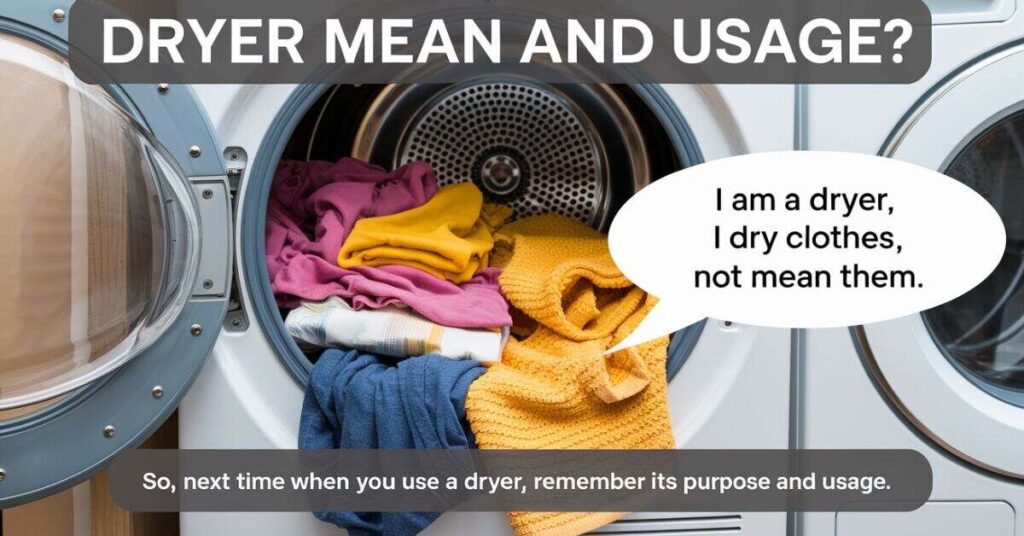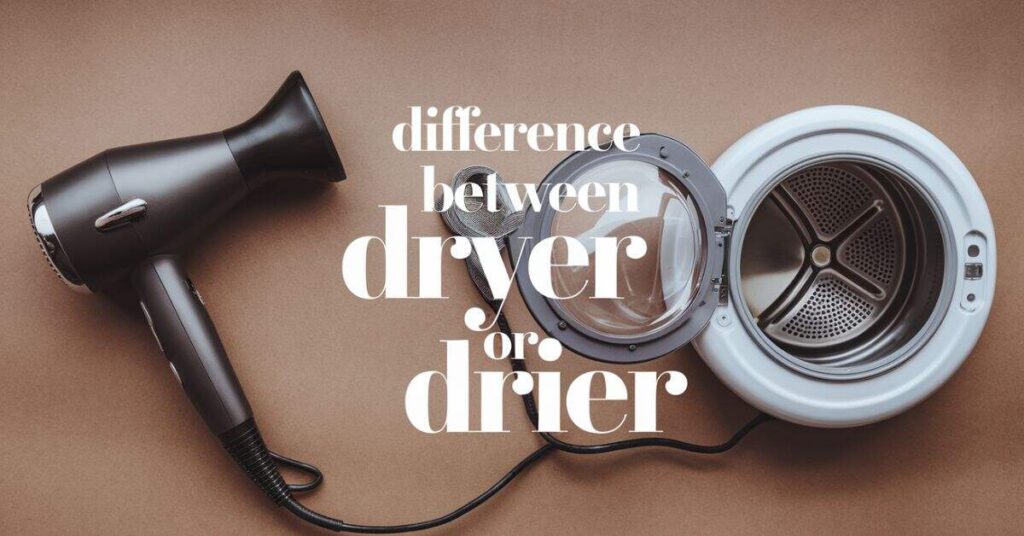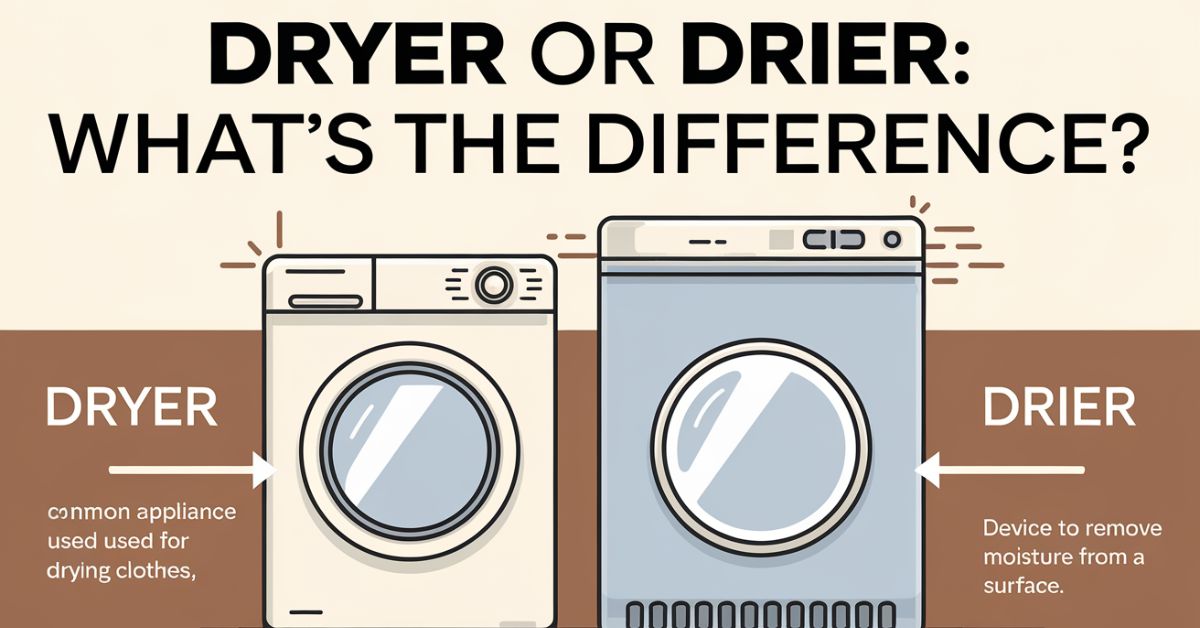The words dryer and drier often confuse people because they sound the same. However, they have different meanings. Dryer refers to a machine that removes moisture from clothes, hair, or air.
Have you ever wondered which one to use? It’s easy to mix them up, but knowing the difference can make your writing clearer. Let’s clear up the confusion once and for all.
Dryer is a noun for an appliance, like a clothes dryer or hair dryer. Drier, on the other hand, is an adjective used when comparing dryness. Remembering this simple rule will help you choose the right word every time.
E-E-A-T FOR ME:
With 5 years of experience in grammar, I, Admin, provide accurate and reliable content. My expertise guarantees clear, top-quality insights. I focus on delivering well-optimized English for optimal understanding.
What Does Dryer Mean and Usage?

Definition of “Dryer”
The word dryer refers to an appliance or machine designed to remove moisture from objects like clothes, hair, or even air. It’s typically a household device that makes life more convenient by helping us dry laundry quickly or style our hair. Dryers are available in different forms, including:
- Clothes dryer: A machine used to dry laundry after washing.
- Hair dryer: A tool used for drying and styling hair.
- Dehumidifier: A machine used to remove excess moisture from the air in a room.
Examples of Dryer in Sentences
- “I need to put my laundry in the dryer before it gets wrinkled.”
- “After the shower, I used the hair dryer to style my hair for the event.”
5 Synonyms for Dryer:
- Dehumidifier: A machine designed to remove moisture from the air.
- Tumble dryer: Another term for a clothes dryer that uses a rotating drum to remove moisture.
- Hairdryer: A device specifically used for drying and styling hair.
- Clothes dryer: The most common term used for a machine that dries clothes.
- Electric dryer: Refers to a dryer that operates using electricity to produce heat.
When to Use “Dryer”
When referring to a machine that removes moisture, dryer is always the correct choice. Whether you’re talking about a clothes dryer, hair dryer, or even a laundry appliance, “dryer” will be used to describe the device responsible for drying. For example, if your washing machine cycle is over and you need to dry your clothes, you would place them in the dryer.
What Does Drier Mean and Usage?
Definition of “Drier”
In contrast, drier is the comparative form of the adjective dry. This means it’s used to describe something that is more dry than another thing. You wouldn’t use drier to refer to a machine; instead, you’d use it when comparing moisture levels, humidity, or dryness between two things.
For instance, if you were to leave a towel out in the sun for an hour, and then compare it to one that stayed in a damp room, you might say, “The towel in the sun is drier than the one inside.”
Examples of Drier in Sentences
- “The desert climate is much drier than the humid coastal air.”
- “This towel is drier than it was earlier.”
5 Synonyms for Drier:
- More arid: A more formal way of saying something is drier.
- More dehydrated: Used when something has lost moisture.
- Less humid: Another way of saying drier, often referring to air.
- More parched: An extreme way of describing dryness, often used for environments.
- Less wet: A basic synonym for drier, used in everyday comparisons.
When to Use “Drier”
You’ll use drier when you’re comparing moisture levels between two things. For example, drier could describe the relative dryness of two fabrics, the atmosphere in two different locations, or even the condition of soil. If one thing has less moisture than another, you would use drier.
Understanding the Difference Between Dryer Or Drier

Now that we’ve broken down the definitions of both terms, let’s compare them side-by-side to make it even clearer.
Key Differences:
| Aspect | Dryer | Drier |
|---|---|---|
| Part of Speech | Noun | Adjective |
| Definition | A machine that removes moisture | The comparative form of “dry” (more dry) |
| Example | “I put my laundry in the dryer.” | “This towel is drier than that one.” |
| Common Context | Refers to machines (e.g., hair dryer) | Used to compare dryness levels |
As you can see from the table, the key difference is that dryer is always a noun, referring to a machine, while drier is an adjective used to describe something that has less moisture than another object.
Grammar Rules and Examples
Dryer:
Dryer should always be used as a noun, specifically referring to a machine. Here are a couple of examples to clarify:
- Correct Usage: “I need to dry my clothes, so I’m going to use the dryer.”
- Incorrect Usage: “My clothes are dryer than yesterday.”
Drier:
Drier is the comparative form of the adjective dry, so you’ll use it when comparing two things. For example:
FAQ“s
How Do You Correctly Spell Drier or Dryer?
The key to remembering the correct spelling is simple: dryer refers to a machine, while drier describes something that is more dry. Whenever you are talking about a device or appliance, use dryer. For a comparison of moisture levels, use drier.
What is a Drier Used For?
A drier is typically used to describe the comparative form of dry when talking about something with less moisture. For example, you might describe a dry climate as drier than a humid one.
Why Do We Use Dryer?
We use a dryer because it’s an efficient way to remove moisture from things like clothes, towels, and hair. Whether it’s a clothes dryer or a hair dryer, these machines help speed up the drying process, especially when the weather is too humid or cold to air dry effectively.
Is It Dry Drier or More Dry?
The correct term is drier, not more dry. When you are comparing two levels of dryness, always use drier.
What is the Comparative of Dry?
The comparative form of dry is drier. It’s used when comparing the moisture levels of two things.
Conclusion
Understanding the difference between dryer or drier is important for clear communication. A dryer is a machine that removes moisture from items like clothes or hair. It can be a clothes dryer or a hair dryer. On the other hand, drier is the comparative form of the adjective dry. It is used when comparing the dryness of two things, such as a drier climate or a drier towel.
By knowing when to use dryer or drier, you can avoid confusion in your writing and speaking. Remember, always use dryer when referring to a machine, and use drier when comparing how dry something is. With this simple rule in mind, you can confidently use both terms correctly.
Remember: Dryer is your go-to when talking about the machine, and drier is the right choice when you’re comparing dryness. So, the next time you’re caught in this dilemma, you’ll know exactly what to choose!
With 5 years of experience in grammar, I, Admin, deliver accurate, clear, and reliable content. My expertise ensures top-quality insights in this niche.

